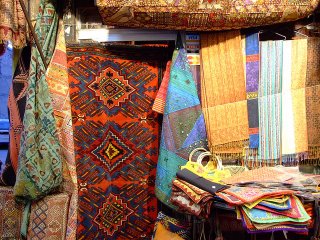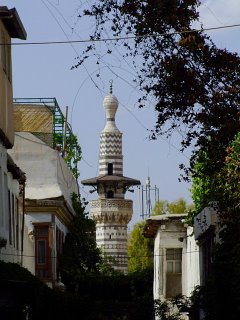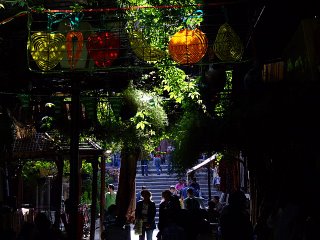Monday, August 21, 2006
Cultures and organisations
There was a marathon workshop session on Saturday to think through aspects of the Trust - vision and mission and so on. It lasted over twelve hours, I have to say largely because there was no discernible process by which the sort of meanderings that always arise at these sessions would be marshalled, filtered and compacted into an agreed resolution. So lots of opening out and very little focusing down. Late in the day we got to discussing organisational shape and structure, and I found myself in disagreement with the management consultants present. Their view of what is needed is a very conventional pyramid-shaped structure with a CEO at the top. My view is that the Trust is about delivery through its programmes, and that these should have primacy, with a much flatter structure, in effect with three CEOs reporting to the First Lady and the Board. I suspect with a CEO we will have almost total disconnect between The First Lady and her projects - not good for her, not good for them. Any CEO has to take her place at the top of the organisation if he/she is to really lead the Trust, and I suspect it will then become a well-run but totally uninteresting organisation, with the First Lady playing a symbolic cypher role only. Not inspiring.
Labels: Massar
Wednesday, August 16, 2006
Happy birthday Jon
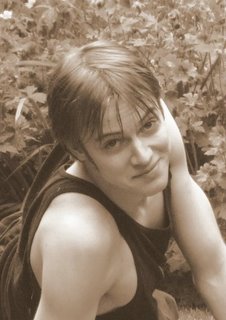 Today is Jon's 20th birthday and I'm away, so I'm thinking of him a lot. Here he is in our garden earlier this summer. Happy birthday Jon.
Today is Jon's 20th birthday and I'm away, so I'm thinking of him a lot. Here he is in our garden earlier this summer. Happy birthday Jon. 
Labels: Home
Tuesday, August 15, 2006
Displays
Branding and the astronomer royal
I've been given responsibility for two other projects related to Massar, and have been asked to draw the three together, still distinct but working to a common plan. This has got me thinking about brands and identity, and surfaced a painful memory from my last days at the Science Museum.
At a meeting of the Board of Trustees I had to present the trading company's business plan (of which I was CEO). It was not a good time. Two of the company's businesses were going to come in way behind forecast so the numbers were not good. I was at loggerheads with the Science museum's Director, Lindsay Sharp, about who actually ran the company - I thought as CEO I did, he thought he did, and meddled continually. It was clear that the company chairman, a superficially charming but unpleasant banker named Martin Smith, was siding with Lindsay rather than me, and my future prospects didn't look good. So I was feeling a bit vulnerable at this Board meeting anyway.
At on point Board questions touched on the Science Museum brand. It was important, someone said, that the work of the trading company did not prejudice the good name of the Science Museum. I replied that the trading company depended to a large extent on the Science Museum brand, it was our strongest selling point, and far from wanting to put it at risk we probably spent more time thinking about it and protecting it than the museum itself did.
To which one Trustee, Sir Martin Rees the Astronomer Royal and a highly respected scientific figure, said loudly and bluntly: "that's a really facile remark". It was clearly not meant as a compliment, and I thought (and still think) it was inaccurate, arrogant, rude and cowardly of him to make it. The conventions of these Board meetings are that staff don't get into a slanging match with Trustees, so the opportunity to challenge him was not open to me. It seemed like gratuitous rudeness from a privileged position - the mark of a small man.
He was not just rude, he was wrong. In all my time at the Science Museum I never found anyone outside the trading company actually thinking in a structured way about what the Science Museum stood for, what it represented, how its values should be articulated internally and externally, what standards it had. There were two pieces of work done on Science Museum editorial standards, one on housestyle and one on editorial independence (from interference by sponsors) and both were done by the trading company. I never found anything in writing produced by museum staff themselves.
Most Science Museum staff, like most museum staff I have ever worked with, took the ethos of the institution they worked for entirely for granted. A gradual accumulation of experience of the institution's ways plus a liberal dash of their own prejudices and desires gave them in time a self-made picture of the character of the place they worked, just as one gets to know a friend, or enemy, over the years. In many cases it led to a "le musee, ce'st moi" attitude, especially amongst curators, where a there was a strong belief that they alone could embody the true spirit of the institution. [This, by the way, is what I suspect was in the mind of Martin Rees: how could mere business people presume to understand the museum better than the scientific curators?] It was a process of selective osmosis. It was just understood, wasn't it?
Of course it wasn't. None of this was ever codified, or challenged, or agreed. Leaving it all vague and unspoken was the easy way out, and of course has led on many occasions to those clashes of cultures for which museums are famous. Curators vs Management. Collections vs Public. Money vs Mission. Highbrow vs Lowbrow, or Dumbing Down. It can also lead to some fairly awful lapses in standard. At the time of this Board meeting the Science Museum's own Antenna website was putting out some truly terrible, trite, unbalanced features, which in my opinion made the museum look amateur, lightweight and partial. A piece on the London congestion charge could have been taken word for word from a GLA press release. But the museum was self-policing, so this was either okay because the museum was doing it, or else no-one even thought to patrol the quality on the website.
For business purposes, a brand can't be taken for granted. It's an asset which has to be nurtured and planned like any other. It can't be presented as one thing by one person and as another by someone else, depending on their convenience. Principles and values, what a company stands for, are the fixed points that sustain you when the going gets tough or complex. The brand, in my view, has to be actively managed if it is to be of value, and if you can't articulate it, then managing it is impossible. That's what the trading company was attending to with the Science Museum brand. It enabled us to charge premium prices for our services, and gave us a way in to almost any company. For us it was a precious jewel, which we had no intention of devaluing. I don't think Sir Martin Rees had any conception of this then, and probably doesn't now. His rudeness still rankles.
At a meeting of the Board of Trustees I had to present the trading company's business plan (of which I was CEO). It was not a good time. Two of the company's businesses were going to come in way behind forecast so the numbers were not good. I was at loggerheads with the Science museum's Director, Lindsay Sharp, about who actually ran the company - I thought as CEO I did, he thought he did, and meddled continually. It was clear that the company chairman, a superficially charming but unpleasant banker named Martin Smith, was siding with Lindsay rather than me, and my future prospects didn't look good. So I was feeling a bit vulnerable at this Board meeting anyway.
At on point Board questions touched on the Science Museum brand. It was important, someone said, that the work of the trading company did not prejudice the good name of the Science Museum. I replied that the trading company depended to a large extent on the Science Museum brand, it was our strongest selling point, and far from wanting to put it at risk we probably spent more time thinking about it and protecting it than the museum itself did.
To which one Trustee, Sir Martin Rees the Astronomer Royal and a highly respected scientific figure, said loudly and bluntly: "that's a really facile remark". It was clearly not meant as a compliment, and I thought (and still think) it was inaccurate, arrogant, rude and cowardly of him to make it. The conventions of these Board meetings are that staff don't get into a slanging match with Trustees, so the opportunity to challenge him was not open to me. It seemed like gratuitous rudeness from a privileged position - the mark of a small man.
He was not just rude, he was wrong. In all my time at the Science Museum I never found anyone outside the trading company actually thinking in a structured way about what the Science Museum stood for, what it represented, how its values should be articulated internally and externally, what standards it had. There were two pieces of work done on Science Museum editorial standards, one on housestyle and one on editorial independence (from interference by sponsors) and both were done by the trading company. I never found anything in writing produced by museum staff themselves.
Most Science Museum staff, like most museum staff I have ever worked with, took the ethos of the institution they worked for entirely for granted. A gradual accumulation of experience of the institution's ways plus a liberal dash of their own prejudices and desires gave them in time a self-made picture of the character of the place they worked, just as one gets to know a friend, or enemy, over the years. In many cases it led to a "le musee, ce'st moi" attitude, especially amongst curators, where a there was a strong belief that they alone could embody the true spirit of the institution. [This, by the way, is what I suspect was in the mind of Martin Rees: how could mere business people presume to understand the museum better than the scientific curators?] It was a process of selective osmosis. It was just understood, wasn't it?
Of course it wasn't. None of this was ever codified, or challenged, or agreed. Leaving it all vague and unspoken was the easy way out, and of course has led on many occasions to those clashes of cultures for which museums are famous. Curators vs Management. Collections vs Public. Money vs Mission. Highbrow vs Lowbrow, or Dumbing Down. It can also lead to some fairly awful lapses in standard. At the time of this Board meeting the Science Museum's own Antenna website was putting out some truly terrible, trite, unbalanced features, which in my opinion made the museum look amateur, lightweight and partial. A piece on the London congestion charge could have been taken word for word from a GLA press release. But the museum was self-policing, so this was either okay because the museum was doing it, or else no-one even thought to patrol the quality on the website.
For business purposes, a brand can't be taken for granted. It's an asset which has to be nurtured and planned like any other. It can't be presented as one thing by one person and as another by someone else, depending on their convenience. Principles and values, what a company stands for, are the fixed points that sustain you when the going gets tough or complex. The brand, in my view, has to be actively managed if it is to be of value, and if you can't articulate it, then managing it is impossible. That's what the trading company was attending to with the Science Museum brand. It enabled us to charge premium prices for our services, and gave us a way in to almost any company. For us it was a precious jewel, which we had no intention of devaluing. I don't think Sir Martin Rees had any conception of this then, and probably doesn't now. His rudeness still rankles.
Labels: Branding
Saturday, August 12, 2006
Books read
I have a rather eclectic selection of books in the apartment, a mix of light and serious, fiction and non. When Helen was over recently her in-plane reading was a book called Indemnity Only by Sarah Paretsky, an early (80s) VI Warchawski crime novel. So I got it out recently and read it. It's the clunkiest, most laboured and humourless book I've read for ages. It's certainly not a thriller. Tolkien writes better dialogue. I can't see how this got to be a cult series if they're all like this one. For instance at one point she's in the middle of a conversation between our heroine and a young girl while driving on the freeway, and one sentence reads: "I changed lanes." That's it, nothing happens, she just tells us she changed lanes as if it was somehow significant. Gripping, no. Relevant, no. Plot development, no. Just clunky.
For comparison I re-read a crime novel by Iain Pears, called The Last Judgement. I like his books, because in part they're about the world of art which I can relate to, but also because they have wit and intelligence. It was like night and day, lightness of touch, good dialogue, interesting plot. Paretsky is American, Pears British, so it's tempting to say something about that, but there are plenty of American authors I enjoy greatly. I think this may be the last Paretsky I try.
For comparison I re-read a crime novel by Iain Pears, called The Last Judgement. I like his books, because in part they're about the world of art which I can relate to, but also because they have wit and intelligence. It was like night and day, lightness of touch, good dialogue, interesting plot. Paretsky is American, Pears British, so it's tempting to say something about that, but there are plenty of American authors I enjoy greatly. I think this may be the last Paretsky I try.
Tuesday, August 08, 2006
The derelict Dummar cement factory
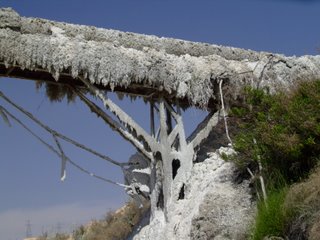
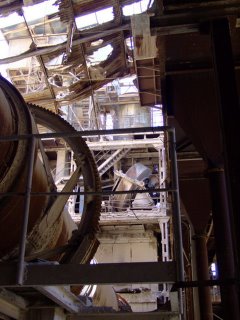
This was, bizarrely, one of the places we were recommended to consider for our discovery centre. The site is huge, with some enormous, ruined industrial buildings in one corner of it. The whole place is covered in cement dust, and probably pretty toxic as well. I recommended that it wasn't ideal, because the clean-up operation alone would have consumed our entire budget.

Labels: Syria
Minaret near Straight Street in the Old City
One year of touring, 20,000 children
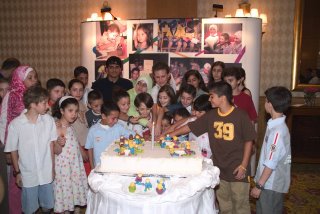 At the 2 July launch we celebrated one year of touring activity with a birthday cake. In the twelve months, we have been to 20 different venues the length and breadth of Syria, and welcomed over 20,000 children to our activities. We invited some of those children to the event, and here they are cutting the cake.
At the 2 July launch we celebrated one year of touring activity with a birthday cake. In the twelve months, we have been to 20 different venues the length and breadth of Syria, and welcomed over 20,000 children to our activities. We invited some of those children to the event, and here they are cutting the cake. 
Labels: Massar
Monday, August 07, 2006
Changes for me
Two things have happened recently which will have quite an effect on me. I have been asked, and agreed, to spend another three years on this project, through to the end of September 2009. This is a much bigger commitment than the original one of two years (which expires this September), and can only work if Helen can come out to visit more often, which she is trying to arrange with her work in London.
At the same time, a Trust is being formed, of which our project will be one part. This looks set to introduce not only some form of CEO to whom I will have to report, which is not a prospect I relish, but a lot more bureaucracy than we have at present. It's a great pleasure working with my team at the moment because we have a very clear team culture, which gets things done fast and effectively, and keeps things very personal. I will have to try and retain this if we become part of a larger organisation, which is never easy with all the drives for standardisation and conformity.
Other stuff going on is a move to a new office and a move for me to a new apartment, situated on the Autostrad (sounds unpleasant but actually I think it will be quite nice).
At the same time, a Trust is being formed, of which our project will be one part. This looks set to introduce not only some form of CEO to whom I will have to report, which is not a prospect I relish, but a lot more bureaucracy than we have at present. It's a great pleasure working with my team at the moment because we have a very clear team culture, which gets things done fast and effectively, and keeps things very personal. I will have to try and retain this if we become part of a larger organisation, which is never easy with all the drives for standardisation and conformity.
Other stuff going on is a move to a new office and a move for me to a new apartment, situated on the Autostrad (sounds unpleasant but actually I think it will be quite nice).
Labels: Massar
Sunday, August 06, 2006
Old city
The new project name - Massar
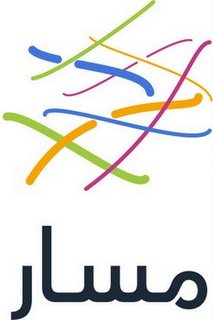 The name for the project is now Massar, which in Arabic means path, route or course of life. The philosophy behind it is: Life offers us many different paths and directions, choices and goals. It is in our own hands which of these paths we look for, which we take, with whom we travel and what we make of the journey.
The name for the project is now Massar, which in Arabic means path, route or course of life. The philosophy behind it is: Life offers us many different paths and directions, choices and goals. It is in our own hands which of these paths we look for, which we take, with whom we travel and what we make of the journey. It's a great name for a project that encourages young people to think about their future and make choices. It's good for our experiences, which themselves are journeys. The lines of the Massar logo represent the interweaving paths life offers us.

Labels: Massar
Presentation at the 2 July launch
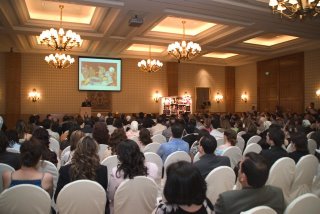 We had around 350 people at the event, ranging from children and families who had attended the touring activities over the past year to half a dozen Cabinet Ministers. I'm in the far distance trying to avoid sending everyone to sleep.
We had around 350 people at the event, ranging from children and families who had attended the touring activities over the past year to half a dozen Cabinet Ministers. I'm in the far distance trying to avoid sending everyone to sleep. 
Labels: Massar
The Massar team at the launch
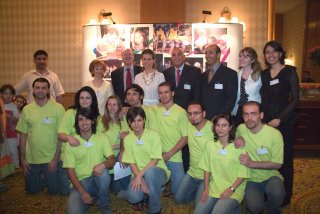 L to R: Ibrahim, Dalia, Shan, Dina, Meis, Me, Bebers, Maha, HE Mrs Al-Assad, Hani, Zuhair, Tarek, Majed, Helen, Mais, Mudar, Razan.
L to R: Ibrahim, Dalia, Shan, Dina, Meis, Me, Bebers, Maha, HE Mrs Al-Assad, Hani, Zuhair, Tarek, Majed, Helen, Mais, Mudar, Razan.Wael was missing as he was at the reception desk.
Those in green t-shirts are, unsurpisingly, the Green Team, who run the touring activities.

Labels: Massar
In support of Syria
One of the things that you become conscious of when you live and work somewhere is how that place gets reported, and Syria is certainly coming in for its fair share of ignorant and unbalanced hostility just now. One interview a few days ago on BBC World left me almost shaking with rage. I had to cut short a call home to go into the office and send the following to the BBC:
I am working in Damascus, so a letter is impractical, but I would like to complain as strongly as possible about the disgraceful Hardtalk interview today by Sarah Montague with the Lebanese Ambassador to the UN, Nouhad Mahmoud. This interview destroyed completely any claim the BBC might make to professionalism, objectivity, balance or even common sense. Throughout the interview Ms Montague made statements about Syria's direct involvement in the current situation, not as suggestions but as firm assertions. "Syria is arming Hezbollah", "Syrian influence", "Syria wishing to re-establish itself in Lebanon", "Syria is using you (Lebanon)". No evidence was produced to back up any of these statements, which were put across as established fact. Virtually no other country was mentioned in terms of having an agenda regarding the current conflict, only Syria, which as far as Ms Montague is concerned is plainly guilty without trial. It became clear during the interview that her principal aim was to paint Syria alone as having caused and now gaining from the situation in Lebanon. Frankly this is just despicable journalism, ranking with the worst tabloid examples, and a sad low for the BBC to have reached. If you have facts to parade then put them on your news programmes. If you just have suppositions then qualify your statements accordingly. I think this interview seriously breached BBC standards and would like it investigated as such. Certainly for me it ended any sense that the BBC is treating the current situation or the region dispassionately. Right now, what the world needs from the BBC is balance and facts, not wild and ill-informed assertions.
In reply I got back this:
Hello and thank you for your most recent email to us.
We were sorry to read that you disliked Sarah Montague's interviewing in this edition of HARDTALK. Of course, in order to steer an interview and reach answers to pertinent questions, an interviewer must sometimes interject, be firm or hard and play "devil's advocate". Sarah's role is to put questions and viewpoints to guests that will elicit answers and illuminate their stand on issues - these will not necessarily be those sympathetic to the guest's position but that does not mean they are the interviewer's personal opinion either nor necessarily statements of fact.
As you know, we will of course pass on your remarks to our editorial and management teams for their consideration.
Thank you for taking the time to contact us,
With regards
Paul Coleman BBC World
To which I replied as follows:
Hello again Paul,
I think anyone objectively looking at the interview would say that Sarah Montague went well beyond the line of devil’s advocacy into a selective and swingeing attack on Syria. I don’t know what her personal or political views are but just as a professional she should be ashamed of herself. Why was no other country cited in her accusations, such as Iran, for example? Why was it apparently assumed by Ms Montague that Israel, say, or the US might not have a less-than-admirable agenda for Lebanon or the region? Was there a hint of such a thing in her interview? If so it didn’t register. Question after question to the Lebanese ambassador was about Syria’s motives only, why? Even the ambassador looked confused at her one-track line of questioning. The whole thing seemed more like someone with an axe to grind (Montague) arguing with someone else on camera.
She ended with the statement “Syria is using you.” No interrogation, actually not even really asking for a response. To most viewers that does not come across as a hard question, but as an interviewer putting across what they know to be a fact. That’s not legitimate provocation, it’s downright irresponsible. Whether any of it was sympathetic to Mr Nouhad Mahmoud’s position or not is frankly irrelevant.
She spent much of the interview insinuating or stating directly that Syria was behind events, was benefiting from them, wanted to re-enter Lebanon. It was not couched as conjecture - “some people suspect that...” or “do you think that...”. Not a shred of evidence was brought forward for any of this. It’s not good enough from a trusted news organisation, and she and you and your editorial and management teams should well know it. It’s on a par with Max Clifford, without any possible claim that it’s just a bit of fun.
I’m not blind to Syria’s part in this, before you classify me as equally one-sided. There is no doubt that funds go from Syria to Hezbollah; there is little doubt that arms go across the Syrian border into Lebanon (geographically the easiest route). Syria’s support for Hezbollah against Israel will continue until talks restart on the return of the Golan, and US and UK foreign policy would be much more productive if it sought to resolve such long-standing regional problems rather than its current simplistic bashing into submission. I don’t condone terrorist activity. Personally I detest violent “solutions” to anything, by anybody.
But unlike Ms Montague I also know what is going on inside Syria, because I’ve worked here for eighteen months. I’ve been fortunate enough to meet with people at the top of government and ordinary people in the street and countryside. I know what is being done here to build a more democratic future and a market economy. I know what a moderate, tolerant, relaxed society it is, even if it is desperately poor in many places. I know how hard the president finds it to drag the hard-liners in his government with him towards the reform he wants. I know that any picture you may have of a dictatorship is not what is happening here. I know what a positive future Syria could have if outsiders can resist instructing it what to do. Sadly, I don’t expect Ms Montague to come and see for herself, or the UK’s foreign policy (which I suspect drives your editorial policy) to change. So the positive facts about Syria, for example that it now shelters and cares for nearly 2 million refugees from the conflicts in Palestine, Afghanistan, Iraq and now Lebanon, won’t get covered by you. Only the lazy “bad Syria” line will be trotted out once more, and another Iraq will become more likely.
The interview was disgraceful. Nothing you have said in your reply makes it less inexcusable.
Regards
Robin
BBC World is a commercial operation, and its editorial policy is highly suspect in my view. It is not covered by the Freedom of Information Act in the UK, unlike its parent organisation. This interview was SO partial that I wonder just what influence can be brought to bear on it.
I am working in Damascus, so a letter is impractical, but I would like to complain as strongly as possible about the disgraceful Hardtalk interview today by Sarah Montague with the Lebanese Ambassador to the UN, Nouhad Mahmoud. This interview destroyed completely any claim the BBC might make to professionalism, objectivity, balance or even common sense. Throughout the interview Ms Montague made statements about Syria's direct involvement in the current situation, not as suggestions but as firm assertions. "Syria is arming Hezbollah", "Syrian influence", "Syria wishing to re-establish itself in Lebanon", "Syria is using you (Lebanon)". No evidence was produced to back up any of these statements, which were put across as established fact. Virtually no other country was mentioned in terms of having an agenda regarding the current conflict, only Syria, which as far as Ms Montague is concerned is plainly guilty without trial. It became clear during the interview that her principal aim was to paint Syria alone as having caused and now gaining from the situation in Lebanon. Frankly this is just despicable journalism, ranking with the worst tabloid examples, and a sad low for the BBC to have reached. If you have facts to parade then put them on your news programmes. If you just have suppositions then qualify your statements accordingly. I think this interview seriously breached BBC standards and would like it investigated as such. Certainly for me it ended any sense that the BBC is treating the current situation or the region dispassionately. Right now, what the world needs from the BBC is balance and facts, not wild and ill-informed assertions.
In reply I got back this:
Hello and thank you for your most recent email to us.
We were sorry to read that you disliked Sarah Montague's interviewing in this edition of HARDTALK. Of course, in order to steer an interview and reach answers to pertinent questions, an interviewer must sometimes interject, be firm or hard and play "devil's advocate". Sarah's role is to put questions and viewpoints to guests that will elicit answers and illuminate their stand on issues - these will not necessarily be those sympathetic to the guest's position but that does not mean they are the interviewer's personal opinion either nor necessarily statements of fact.
As you know, we will of course pass on your remarks to our editorial and management teams for their consideration.
Thank you for taking the time to contact us,
With regards
Paul Coleman BBC World
To which I replied as follows:
Hello again Paul,
I think anyone objectively looking at the interview would say that Sarah Montague went well beyond the line of devil’s advocacy into a selective and swingeing attack on Syria. I don’t know what her personal or political views are but just as a professional she should be ashamed of herself. Why was no other country cited in her accusations, such as Iran, for example? Why was it apparently assumed by Ms Montague that Israel, say, or the US might not have a less-than-admirable agenda for Lebanon or the region? Was there a hint of such a thing in her interview? If so it didn’t register. Question after question to the Lebanese ambassador was about Syria’s motives only, why? Even the ambassador looked confused at her one-track line of questioning. The whole thing seemed more like someone with an axe to grind (Montague) arguing with someone else on camera.
She ended with the statement “Syria is using you.” No interrogation, actually not even really asking for a response. To most viewers that does not come across as a hard question, but as an interviewer putting across what they know to be a fact. That’s not legitimate provocation, it’s downright irresponsible. Whether any of it was sympathetic to Mr Nouhad Mahmoud’s position or not is frankly irrelevant.
She spent much of the interview insinuating or stating directly that Syria was behind events, was benefiting from them, wanted to re-enter Lebanon. It was not couched as conjecture - “some people suspect that...” or “do you think that...”. Not a shred of evidence was brought forward for any of this. It’s not good enough from a trusted news organisation, and she and you and your editorial and management teams should well know it. It’s on a par with Max Clifford, without any possible claim that it’s just a bit of fun.
I’m not blind to Syria’s part in this, before you classify me as equally one-sided. There is no doubt that funds go from Syria to Hezbollah; there is little doubt that arms go across the Syrian border into Lebanon (geographically the easiest route). Syria’s support for Hezbollah against Israel will continue until talks restart on the return of the Golan, and US and UK foreign policy would be much more productive if it sought to resolve such long-standing regional problems rather than its current simplistic bashing into submission. I don’t condone terrorist activity. Personally I detest violent “solutions” to anything, by anybody.
But unlike Ms Montague I also know what is going on inside Syria, because I’ve worked here for eighteen months. I’ve been fortunate enough to meet with people at the top of government and ordinary people in the street and countryside. I know what is being done here to build a more democratic future and a market economy. I know what a moderate, tolerant, relaxed society it is, even if it is desperately poor in many places. I know how hard the president finds it to drag the hard-liners in his government with him towards the reform he wants. I know that any picture you may have of a dictatorship is not what is happening here. I know what a positive future Syria could have if outsiders can resist instructing it what to do. Sadly, I don’t expect Ms Montague to come and see for herself, or the UK’s foreign policy (which I suspect drives your editorial policy) to change. So the positive facts about Syria, for example that it now shelters and cares for nearly 2 million refugees from the conflicts in Palestine, Afghanistan, Iraq and now Lebanon, won’t get covered by you. Only the lazy “bad Syria” line will be trotted out once more, and another Iraq will become more likely.
The interview was disgraceful. Nothing you have said in your reply makes it less inexcusable.
Regards
Robin
BBC World is a commercial operation, and its editorial policy is highly suspect in my view. It is not covered by the Freedom of Information Act in the UK, unlike its parent organisation. This interview was SO partial that I wonder just what influence can be brought to bear on it.
Labels: Viewpoint
Subscribe to Comments [Atom]

